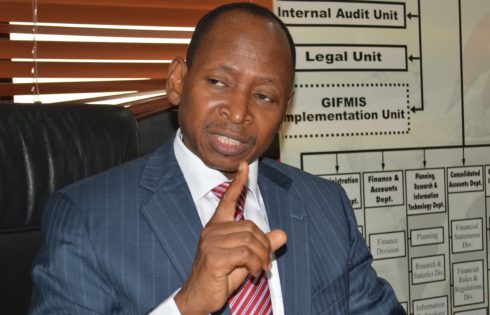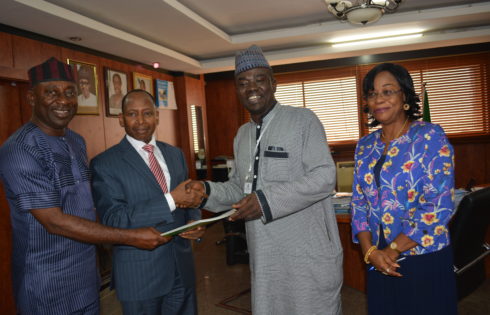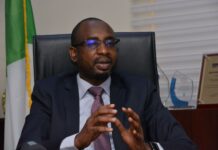

TSA Hit Over N7trillion Mr Ahmed Idris, the Accountant General of the Federation will soon be two years on the saddle, since his appointment in June 2015 by President Muhammadu Buhari. He was Director of Finance and Account at the Federal Ministry of Mines and Steel Development prior to his present position.
Mr Idris who had also served as Director of Finance and Accounts at the Nigeria Security and Civil Defence Corps (NSCDC) headquarters, Abuja is a chartered accountant with over two decades of working experience.
A Fellow of Association of National Accountants of Nigeria and Fellow, Association of Financial Analysts of Nigeria, he is Member of other professional bodies including Chartered Institute of Taxation of Nigeria, Certified Institute of Cost Management of Nigeria and Association of Certified Fraud Examiners.
Born on November 25, 1960, Mr. Idris started his working experience as Audit Officer at Muhtari Dangana and Co, Chartered Accounts Firm, Kano in 1985. He was also Head, Loan Syndication Unit of Continental Merchants Bank between 1989 and 1994 before moving to TY Chemical Limited (White Oil Refinery) in Kaduna as Senior Management Accountant.
He joined the public service as Assistant Director Petroleum Trust Fund (PTF) in charge of Financial Analysis in 2000. He was at the National Poverty Eradication Programme(NAPEP), Ministry of Police Affairs and Ministry of Interior as Assistant Director Finance. He was Deputy Director in the Federal Ministry of Interior and Office of the Accountant General of the Federation (OAGF) before his promotion as Director Accounts in OAGF in 2011.
A 1984 BSc Accounting graduate of Ahmadu Bello University (ABU) Zaria, Idris obtained Masters of Business Administration (MBA) from Bayero University Kano and Master of International Affairs and Diplomacy (MIAD) from ABU Zaria. He had also attended local and foreign courses including Revenue Generation and Accountability for Local Governments organised by Institute of Chartered Accountants of Nigeria (ICAN); World Bank Disbursement Seminar, Reston, Virginia USA; IPSAS Course, Manchester Business School, United Kingdom, among several others.
Married with Children, the hobbies of the new Accountant General of the Federation include reading, academic discussion and excursion.
In this interview with Economic Confidential in Abuja, Mr. Idris carried the Editorial Team led by the Managing Editor, Ewache Ajefu into strides of the Office of the Accountant General of the Federation, most especially the Treasury Single Account(TSA) policy, the Integrated Payroll and Personnel Information System(IPPIS), the Federation Account and other issues in governance. Excerpts:
EC: Tell us about the welfare packages put in place by your administration since you were appointed as the Accountant General of the Federation?
AGF: The welfare of the staff of the Office of the Accountant General of the Federation is one of my cardinal objectives since I assume office. It is even a core objective I must say as managers of the treasury. Welfare as you may know promotes the best out of the staff apart from making them serve the system very well. There are different types of welfare for the staff of the OAGF. Some border on entitlements, training to enhance the capabilities of the staff. We have also done very well in the provision of brand new staff buses we sourced from public spirited organizations including banks.
EC: What about Federal Treasury Academy?
On the part of the Federal Treasury Academy, we have done very well in building hostel facilities, renovation of infrastructure and provision of generators, furniture for the classrooms and the auditorium and the provision of sporting facilities among others. Right now, there is an ongoing discussion with some real estate developers to build four hundred one bed-room and two-bedroom houses at our land situated at Federal Treasury Academy Orozo, Abuja. These developments are targeted at lower cadre officers. All these are some of the initiatives we have put in place. We pay the first 28 days to staff on first come first serve basis and each month we set aside the sum of N5 million towards that. Any staff that gets admission to tertiary institutions on part-time basis and would not disrupt his or her job schedule is allowed. So far, we have given approval to such staff almost one thousand, most especially Nasarawa state University and University of Abuja. We train them and also promote them, we maintain facilities here at the headquarters, we maintain and buy new furniture, apart from making the office environment conducive for work. This is part of motivation, this is part of welfare.
EC: How far have you gone in implementing the Integrated Payroll and Personnel Information System (IPPIS)?
AGF: On the IPPIS, its generally introduced to save costs and make savings. It helps us to remove names of those who are not supposed to be in the payroll. Subject to verification, if we found out that such names are not supposed to be there, we give them names like ghost workers. It has given us fantastic results as government is even doing more just as para-military, military and the police are brought on board. And not only that, hospitals, teaching hospitals and even Universities are also on the line. We just finished discussing with a consultant on an issue bordering on IPPIS implementation.
EC: As the Secretariat of the Federation Account Allocation Committee (FAAC), how is your office (OAGF Managed the Federation Account disbursements?
AGF: Now let me not be political. But you and I know we can’t do away with politics more especially as this is a government of change. You talk of transparency and openness, and these are key to the present administration. It is a desire to institute discipline, good governance and trust. The government cannot be trusted if it says one thing and does another. The meagre revenue that has been accruing is being judiciously used and there is fiscal discipline in management of public resources. Let me give you an example in the previous administration. There was a time state government kicked against savings. Now because what they know and being practiced by government of the day, they have decided to imbibe the culture of savings. What am I trying to say? We have excess Petroleum Profit Tax (PPT). These are excess taxes from petroleum tax. When we get money over and above budgeted figure, the excess is always being saved. If it were before, state governments and other stakeholders would say it should be shared. And this is what has been giving us buffer, especially at the time of recession. Despite the lean resources, we take from it and augment accordingly. And this is being done transparently. All the stakeholders are aware of balances at any point in time. Whatever revenue comes in is shown at National Economic Council meetings including all the governors who will be briefed by the Minister of Finance. They have seen the openness and have accepted what government has put in place and the economic team. This is why we are achieving remarkable success amidst recession in the monthly disbursements of funds from the Federation Account.
EC: Tell us about the successes of Treasury Single Account (TSA)
AGF: TSA is a government policy introduced due to obvious shortcomings we saw in the system. Firstly, revenues were not accruing the way they should. Secondly, there were leakages even in the little that was coming in. Thirdly, there were borrowings associated with multiplicity of banks accounts being operated by ministries, departments and agencies (MDAs). The government just felt there was need to bring sanity. For instance, why will one university have over one hundred and twenty bank accounts, and some of them even hidden and missing and carrying huge balances. We also discovered that there are costs associated with keeping these multiple bank accounts. Every month the government incurs over N4 billion in maintaining these accounts! Yet Government is borrowing its own money. And to stop government from borrowing its money and for the fact that there were no commensurate returns on such monies, it was double tragedy! This is like a sword with two sides that can cut from any of the sides. Sanity was brought with the introduction of TSA. It has achieved its principal objective of consolidating Federal Government banking arrangement and providing a single window for determining government cash position. It has also assisted in blocking leakages and bringing about transparency and accountability in the management of public resources. Like I often said, TSA enables timely and complete view of cash position and efficient cash management through regular monitoring of balances. It has also eliminated of idle funds hitherto with commercial banks. With ability to monitor the operations of all MDAs through OAGF, it has significantly improved IGR collection through direct remittance of all revenues to the TSA under the e-collection initiative.

EC: what is the last balance on the TSA?
AGF: When we say we have over N5 trillion in TSA, it does not mean free funds for spending. No! no! no! These monies belong to various ministries, departments and agencies put in a portal in such a way that you can view the entire balance as one. The movement is now over N7 trillion. But as I explained earlier, these are not free money. People should not be thinking of why is government borrowing to fund budget. These are budgeted monies for MDAs for projects and developments. But let me also make a strong and important point. If not because TSA is in place and now that the recession is here, only God knows what would have happened. A monthly drain of over N4 billion and yet no revenue coming in and leakages continued. It could have been a disaster. It was government’s foresightedness and focus even as TSA was in place before the recession. And that is why we are floating and not sinking, and we will not sink, God willing.

































